 Paying rent on time is one of the most important qualities that landlords look for in tenants, as late or missed rent payments can significantly affect the landlord’s personal income as well as their ability to properly manage the property.
Paying rent on time is one of the most important qualities that landlords look for in tenants, as late or missed rent payments can significantly affect the landlord’s personal income as well as their ability to properly manage the property.
However, that doesn’t mean that landlords are totally unforgiving when it comes to tenant rent payment issues. Sometimes, extenuating circumstances can cause tenants to have to delay a payment, which is why many landlords have a rent grace period outlined in their lease agreements.
How Long Is a Rent Grace Period?
The length of a grace period that tenants are allowed before late fees are uncured will vary from state to state. In some states, there is a defined grace period that all landlords have to abide by. In other states, landlords are allowed to set their own grace period. However, rent grace periods are rarely longer than five days.
Are Rent Grace Periods Required?
If you live in a state where landlords have a defined graced period, then tenants must be allowed that period before late rent fees are applied. If you live in a state where landlords set their own grace periods, then your landlord isn’t necessarily required to give one. The details of whether your property offers a rent grace period should be outlined clearly in your lease agreement.
What Is the Typical Late Fee?
Late fees will start to apply the day that the rent grace period expires, and their purpose is to dissuade tenants from falling behind on rent. In general, most landlords will charge 5% of your monthly rent total in late fees, though some landlords opt for a flat fee instead.
The best way to optimize your Maryland rental property is with a high-quality property manager. Contact Reliable Property Management, Inc. at (443) 869-3799 today to learn more.

